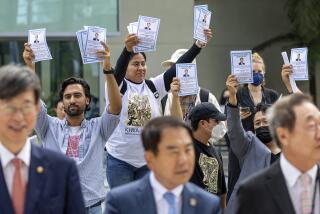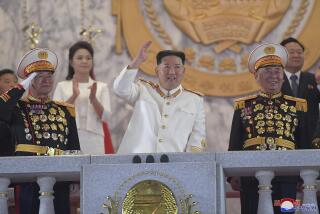Economy Unscathed in S. Korea Protests
SEOUL, South Korea — Students clashed with police Monday here and in Kwangju, the provincial capital where seven years ago almost 200 people were killed demonstrating against a power grab by President Chun Doo Hwan. Monday’s demonstrators at Kwangju burned Chun in effigy.
Coincidentally, the Bank of Korea announced Monday that South Korea’s economic growth in the first three months of the year was an impressive 15.6%.
The economic announcement, coupled with signs of business as usual--bustling shoppers, the customary traffic jams--indicated that political unrest has failed to cause any significant disruption, even on the anniversary of what has come to be known as the Kwangju incident.
On May 18, 1980, amid widespread unrest after a military coup that gave Chun, then an army general, effective control of the country, students and dissidents rose up at Kwangju, 170 miles south of here, and seized the city. At Chun’s order, paratroopers stormed the city and put down the uprising.
Among those taking part in Monday’s demonstration at Kwangju were relatives of people killed in 1980, along with members of the National Assembly representing the new, opposition Reunification Democratic Party.
President Chun was denounced. People shouted “Bring back our sons!” and “Bring Chun Doo Hwan here!” They stoned a city government car, then set fire to it. An effigy of Chun was stabbed and burned.
Kim Young Sam, president of the Reunification Democratic Party, sent a message threatening “all-out struggle . . . if our demand for democratization is blocked.”
Hundreds of riot police turned back people trying to get into the cemetery where the demonstration took place. Only relatives of the dead and selected opposition representatives were permitted to enter.
At Kwangju’s Chonnam University, thousands of policemen forcefully prevented about 2,000 students from breaking out into the streets.
Gas Used Against Students
In Seoul, policemen closed all the gates leading into Dongguk University and fired canisters of eye-stinging pepper gas at students trying to break out.
Sporadic scuffles also broke out at Korea University and Seoul National University. At Yonsei University, about 1,500 students met to commemorate the Kwangju incident and denounce Chun.
Protests have been gaining momentum since April 13, when Chun halted all debate on constitutional revision until after the 1988 Olympic Games, which are scheduled to take place here in October of next year. Earlier he had promised to allow the legislature to revise the constitution before his successor is chosen next February.
All across the country, the entire force of 120,000 policemen is reported to be on full alert, with orders to suppress any sign of protest. Yet dissident activity is expected to continue at least until the universities close next month for the summer vacation.
Meanwhile, Chun’s Democratic Justice Party issued a new threat to the opposition. It said that if the Reunification Democratic Party refuses to revise its platform, which pledges to reunify South Korea with Communist North Korea, it will be “subjected to historical punishment.”
Kim Jung Nam, a spokesman for the ruling party, said, “Our party wishes to make it clear that the Reunification Democratic Party will be held responsible for all consequences that may result from its refusal to revise its platform.”
Earlier, ruling party officials had threatened to take steps to abolish the new party, formed May 1 by Kim Young Sam and former opposition presidential candidate Kim Dae Jung. The party includes 66 of the 274 members of the National Assembly.
The Bank of Korea’s announcement said that economic growth between January and March was the highest for any three-month period since the first quarter of 1979, when growth was 16.1%.
More to Read
Sign up for Essential California
The most important California stories and recommendations in your inbox every morning.
You may occasionally receive promotional content from the Los Angeles Times.










